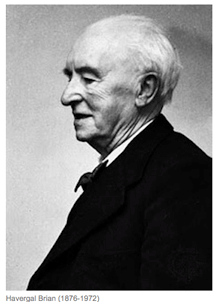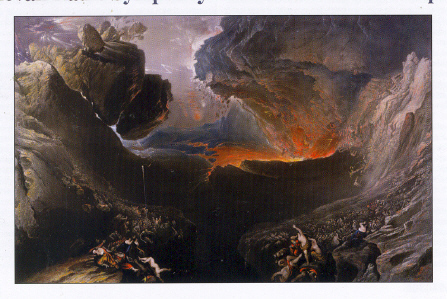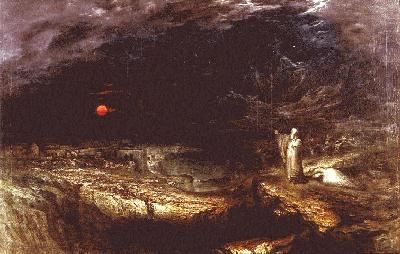Havergal Brian Symphonies 
Nos 22, 23 & 24
Symphony No. 22 ‘Symphonia brevis’
Symphony No. 23 World Première Recording
Symphony No. 24 in D major World Première Recording
English Suite No. 1, Op. 12
New Russia State Symphony Orchestra/Alexander Walker
Naxos 8572833
Havergal Brian, the most prolific of symphonists, composed 27 of his 32 symphonies between 72 and 92, three of them a compact trilogy fitting onto one disc, with spare room for his early English Suite No 1, which made a mark under Henry Wood at the Proms in 1907... Dates are important.
I am a long-time Brian enthusiast, with an indelible memory of him in 1961, comigon the Albert Hall platform to acknowledge acclamation of his Gothic Symphony (see Hyperion Purcell to Brian 2011).
The Naxos notes by Malcolm MacDonald are copious, partly taken from the second of his three large volumes of books on Brian's Symphonies. These new Russian performances are vividly recorded and sound excellent. At bargain price they can be recommended without reservation.
But if you want a dismissive review for balance, there is in The Guardian Andrew Clements, who notes the "rough-hewn brashness" of the symphonies, with "tonal refinement not a high priority" for the New Russia State Symphony" !
Please note too that many of Brian's symphonies are to be heard on YouTube. I've been wallowing in them.
Peter Grahame Woolf May 2013
Nos 4 & 12 
Symphony No 4 "Das Siegeslied" (Psalm of Victory)
Symphony No 12
Jana Valásková
Slovak Philharmonic Choir, Slovak National Opera Chorus,
Youth "Echo" Choir, Mixed "Cantus" Choir,
Brno Philharmonic Choir,
Czecho-Slovak Radio Symphony Orchestra (Bratislava)/Adrian Leaper
Naxos 8.570308 TT: 61 mins
This prodigious recording near-miracle has a history, of which I would hope the latest reincarnation of the (affordable) Czech recordings, originally for Marco Polo, is not the end of the story.
It needs to be not the last word on Brian's rarely heard and over-the-top grandiose Psalm of Victory (1933) because it is unlikely that this performance has sorted out its complexity as well as a Simon Rattle might have done (and had done for Maw's Odyssey, hugest of sprawling "symphonies"). The pitiless German text was tackled with a will (in its historical context!), but is often near unintelligible; unimportantly, besause it is not set by Brian in more than a generalised manner.
The musical essence is the turmoil of diverse idioms and orchestral expression, often violently militaristic, depicting Psalmic doom, well paralleled in Naxos' presentation by Mottram's The Great Day of his Wrath as a too-uncommonly apt cover illustration, reproduced above.
The joint orchestral line-up in Bratislava, 1992 - six flutes, two oboes, two oboi d'amore, two cors anglais, bass oboe, six clarinets plus two bassett horns, two bass clarinets and pedal clarinet; four bassoons, two double-bassoons, eight horns, four trumpets, five trombones, two tubas, two sets of timpani, two harps, glockenspiel, xylophone, triangle, bell, organ and strings - is such as might have turned Gubaidulina's head in emulation if she was aware of this obscure Englishman.
So it offers a great 50 minute noise, described by Naxos as music of barbaric splendour and violent contrasts, and a must for Brian enthusiasts even if not definitive and ideal.
No such problems with the compact craggy No 12, which has many surprises in its brief 'vestigial four movement design' between beginning with a glockenspiel solo and ending with 'the fateful stroke of a gong'!
Peter Grahame Woolf
Havergal Brian Symphony No 2 
Moscow Symphony Orchestra/Tony Rowe
Naxos 8.570506 TT: 55 mins
Another hugely welcome addition to the current Brian discography.
No 2 (1931) is another visionary masterpiece of enormous scope and the freedom and originality we have come to expect from this unique composer, who is celebrated on disc if not in the concert hall. In a (fairly) conventional four movement form, though played continuously.
Malcolm MacDonald is again our guide with a detailed analysis tied to the 16 track numbers which makes the CD convenient for further study. He assures us that nothing vital is lost by performing it, as here, with eight horns instead of the prescribed sixteen...
Sir Charles Mackerras conducted its first professional performance (BBC, 1979) - how many since? - and the BBC seems to have lost a great opportunity by not asking him to do so again for his 80th birthday celebrations.
And in these times when concerts have become shorter and the traditional overture as an opener has all but disappeared, what about slipping in the fill-up here as a surprise extra one day? Festival Fanfare (1973) is a brilliant compact miniature, less than two minutes of evolving music, which "scorns repetition as each rhythm and phrase suggests the next" (Malcolm MacDonald).
This 1996 recording for Marco Polo is unmissable on this bargain reissue. The illustration is of John Martin's The Last Man, apt for this iconoclast, neglected throughout most of his long life.
Peter Grahame Woolf
|



